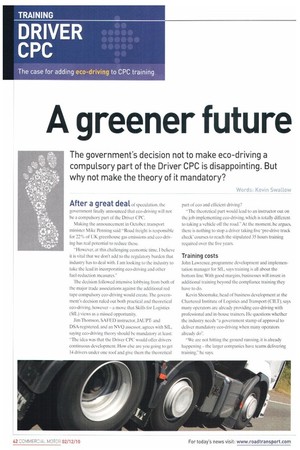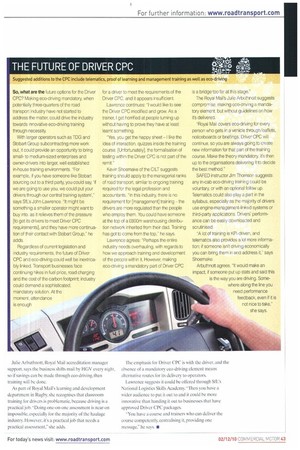A greener future
Page 42

Page 43

If you've noticed an error in this article please click here to report it so we can fix it.
The government's decision not to make eco-driving a compulsory part of the Driver CPC is disappointing. But why not make the theory of it mandatory?
Words: Kevin Swallow After a great dealof speculation, the government finally announced that eco-driving will not be a compulsory part of the Driver CPC.
Making the announcement in October, transport minister Mike Penning said: -Road freight is responsible for 22% of UK greenhouse gas emissions and eco-driving has real potential to reduce these.
"However, at this challenging economic time. I believe it is vital that we don't add to the regulatory burden that industry has to deal with. I am looking to the industry to take the lead in incorporating eco-driving and other fuel-reduction measures."
The decision followed intensive lobbying from both of the major trade associations against the additional red tape compulsory eco-driving would create. The government's decision ruled out both practical and theoretical eco-driving, however — a move that Skills for Logistics (SfL) views as a missed opportunity.
Jim Thomson. SAFED instructor, JAUPTand DSA-registered, and an NVQ assessor, agrees with S11., saying eco-driving theory should be mandatory at least: "The idea was that the Driver CPC would offer drivers continuous development. How else are you going to get 14 drivers under one roof and give them the theoretical part of eco and efficient driving?
"The theoretical part would lead to an instructor out on the job implementing eco-driving. which is totally different to taking a vehicle off the road." At the moment. he argues, there is nothing to stop a driver taking five 'pre-drive truck cheek' courses to reach the stipulated 35 hours training required over the five years.
Training costs
John Lawrence, programme development and implementation manager for SfL, says training is all about the bottom line. With good margins, businesses will invest in additional training beyond the compliance training they have to do.
Kevin Shoemake, head of business development at the Chartered Institute of Logistics and Transport (CET), says many operators are already providing eco-driving with professional and in-house trainers. He questions whether the industry needs "a government stamp of approval to deliver mandatory eco-driving when many operators already do".
"We are not hitting the ground running. it is already happening — the larger companies have teams delivering training,he says.
Julie Arbuthnott, Royal Mail accreditation manager support, says the business shifts mail by HGV every night, so if savings can be made through eco-driving, then training will be done.
As part of Royal Mail's learning and development department in Rugby, she recognises that classroom training for drivers is problematic, because driving is a practical job. "Doing one-on-one assessment is near-on impossible, especially for the majority of the haulage industry. However, it's a practical job that needs a practical assessment," she adds. The emphasis for Driver CPC is with the driver, and the absence of a mandatory eco-driving element means alternative routes for its delivery to operators.
Lawrence suggests it could be offered through SfL's National Logistics Skills Academy, -Then you have a wider audience to put it out to and it could he more innovative than handing it out to businesses that have approved Driver CPC packages.
You have a course and trainers who can deliver the course competently. centralising it, providing one message," he says. I
































































































































